Based on @watcher's answer, I came up with the following code. It works great in my test cases. I also made a GitHub repository with my code, as it is far better readable than here on StackOverflow.
<?php
/**
* A simple class to auto-calculate the "perfect" column widths of a table.
* Copyright (C) 2014 Christian Flach
*
* This program is free software; you can redistribute it and/or modify
* it under the terms of the GNU General Public License as published by
* the Free Software Foundation; either version 2 of the License, or
* (at your option) any later version.
*
* This program is distributed in the hope that it will be useful,
* but WITHOUT ANY WARRANTY; without even the implied warranty of
* MERCHANTABILITY or FITNESS FOR A PARTICULAR PURPOSE. See the
* GNU General Public License for more details.
*
* You should have received a copy of the GNU General Public License along
* with this program; if not, write to the Free Software Foundation, Inc.,
* 51 Franklin Street, Fifth Floor, Boston, MA 02110-1301 USA.
*
* This is based on my question at StackOverflow:
* http://stackoverflow.com/questions/24394787/how-to-calculate-the-perfect-column-widths
*
* Thank you "watcher" (http://stackoverflow.com/users/697370/watcher) for the initial idea!
*/
namespace Cmfcmf;
class ColumnWidthCalculator
{
/**
* @var array
*/
private $rows;
/**
* @var bool
*/
private $html;
/**
* @var bool
*/
private $stripTags;
/**
* @var int
*/
private $minPercentage;
/**
* @var Callable|null
*/
private $customColumnFunction;
/**
* @param array $rows An array of rows, where each row is an array of cells containing the cell content.
* @param bool $html Whether or not the rows contain html content. This will call html_entity_decode.
* @param bool $stripTags Whether or not to strip tags (only if $html is true).
* @param int $minPercentage The minimum percentage each row must be wide.
* @param null $customColumnFunction A custom function to transform a cell's value before it's length is measured.
*/
public function __construct(array $rows, $html = false, $stripTags = false, $minPercentage = 3, $customColumnFunction = null)
{
$this->rows = $rows;
$this->html = $html;
$this->stripTags = $stripTags;
$this->minPercentage = $minPercentage;
$this->customColumnFunction = $customColumnFunction;
}
/**
* Calculate the column widths.
*
* @return array
*
* Explanation of return array:
* - $columnSizes[$colNumber]['percentage'] The calculated column width in percents.
* - $columnSizes[$colNumber]['calc'] The calculated column width in letters.
*
* - $columnSizes[$colNumber]['max'] The maximum column width in letters.
* - $columnSizes[$colNumber]['avg'] The average column width in letters.
* - $columnSizes[$colNumber]['raw'] An array of all the column widths of this column in letters.
* - $columnSizes[$colNumber]['stdd'] The calculated standard deviation in letters.
*
* INTERNAL
* - $columnSizes[$colNumber]['cv'] The calculated standard deviation / the average column width in letters.
* - $columnSizes[$colNumber]['stdd/max'] The calculated standard deviation / the maximum column width in letters.
*/
public function calculateWidths()
{
$columnSizes = array();
foreach ($this->rows as $row) {
foreach ($row as $key => $column) {
if (isset($this->customColumnFunction)) {
$column = call_user_func_array($this->customColumnFunction, array($column));
}
$length = $this->strWidth($this->html ? html_entity_decode($this->stripTags ? strip_tags($column) : $column) : $column);
$columnSizes[$key]['max'] = !isset($columnSizes[$key]['max']) ? $length : ($columnSizes[$key]['max'] < $length ? $length : $columnSizes[$key]['max']);
// Sum up the lengths in `avg` for now. See below where it is converted to the actual average.
$columnSizes[$key]['avg'] = !isset($columnSizes[$key]['avg']) ? $length : $columnSizes[$key]['avg'] + $length;
$columnSizes[$key]['raw'][] = $length;
}
}
// Calculate the actual averages.
$columnSizes = array_map(function ($columnSize) {
$columnSize['avg'] = $columnSize['avg'] / count ($columnSize['raw']);
return $columnSize;
}, $columnSizes);
foreach ($columnSizes as $key => $columnSize) {
$colMaxSize = $columnSize['max'];
$colAvgSize = $columnSize['avg'];
$stdDeviation = $this->sd($columnSize['raw']);
$coefficientVariation = $stdDeviation / $colAvgSize;
$columnSizes[$key]['cv'] = $coefficientVariation;
$columnSizes[$key]['stdd'] = $stdDeviation;
$columnSizes[$key]['stdd/max'] = $stdDeviation / $colMaxSize;
// $columnSizes[$key]['stdd/max'] < 0.3 is here for no mathematical reason, it's been found by trying stuff
if(($columnSizes[$key]['stdd/max'] < 0.3 || $coefficientVariation == 1) && ($coefficientVariation == 0 || ($coefficientVariation > 0.6 && $coefficientVariation < 1.5))) {
// The average width of the column is close to the standard deviation
// In this case I would just make the width of the column equal to the
// average.
$columnSizes[$key]['calc'] = $colAvgSize;
} else {
// There is a large variance in the dataset (really small values and
// really large values in the same set).
// Do some magic! (There is no mathematical rule behind that line, it's been created by trying different combinations.)
if ($coefficientVariation > 1 && $columnSizes[$key]['stdd'] > 4.5 && $columnSizes[$key]['stdd/max'] > 0.2) {
$tmp = ($colMaxSize - $colAvgSize) / 2;
} else {
$tmp = 0;
}
$columnSizes[$key]['calc'] = $colAvgSize + ($colMaxSize / $colAvgSize) * 2 / abs(1 - $coefficientVariation);
$columnSizes[$key]['calc'] = $columnSizes[$key]['calc'] > $colMaxSize ? $colMaxSize - $tmp : $columnSizes[$key]['calc'];
}
}
$totalCalculatedSize = 0;
foreach ($columnSizes as $columnSize) {
$totalCalculatedSize += $columnSize['calc'];
}
// Convert calculated sizes to percentages.
foreach ($columnSizes as $key => $columnSize) {
$columnSizes[$key]['percentage'] = 100 / ($totalCalculatedSize / $columnSize['calc']);
}
// Make sure everything is at least 3 percent wide.
if ($this->minPercentage > 0) {
foreach ($columnSizes as $key => $columnSize) {
if ($columnSize['percentage'] < $this->minPercentage) {
// That's how many percent we need to steal.
$neededPercents = ($this->minPercentage - $columnSize['percentage']);
// Steal some percents from the column with the $coefficientVariation nearest to one and being big enough.
$lowestDistance = 9999999;
$stealKey = null;
foreach ($columnSizes as $k => $val) {
// This is the distance from the actual $coefficientVariation to 1.
$distance = abs(1 - $val['cv']);
if ($distance < $lowestDistance
&& $val['calc'] - $neededPercents > $val['avg'] /* This line is here due to whatever reason :/ */
&& $val['percentage'] - $this->minPercentage >= $neededPercents /* Make sure the column we steal from would still be wider than $this->minPercentage percent after stealing. */
) {
$stealKey = $k;
$lowestDistance = $distance;
}
}
if (!isset($stealKey)) {
// Dang it! We could not get something reliable here. Fallback to stealing from the largest column.
$max = -1;
foreach ($columnSizes as $k => $val) {
if ($val['percentage'] > $max) {
$stealKey = $k;
$max = $val['percentage'];
}
}
}
$columnSizes[$stealKey]['percentage'] = $columnSizes[$stealKey]['percentage'] - $neededPercents;
$columnSizes[$key]['percentage'] = $this->minPercentage;
}
}
}
return $columnSizes;
}
/**
* Function to calculate standard deviation.
* http://stackoverflow.com/a/5434698/697370
*
* @param $array
*
* @return float
*/
protected function sd($array)
{
if (count($array) == 1) {
// Return 1 if we only have one value.
return 1.0;
}
// Function to calculate square of value - mean
$sd_square = function ($x, $mean) { return pow($x - $mean,2); };
// square root of sum of squares devided by N-1
return sqrt(array_sum(array_map($sd_square, $array, array_fill(0,count($array), (array_sum($array) / count($array)) ) ) ) / (count($array)-1) );
}
/**
* Helper function to get the (approximate) width of a string. A normal character counts as 1, short characters
* count as 0.4 and long characters count as 1.3.
* The minimum width returned is 1.
*
* @param $text
*
* @return float
*/
protected function strWidth($text)
{
$smallCharacters = array('!', 'i', 'f', 'j', 'l', ',', ';', '.', ':', '-', '|',
' ', /* normal whitespace */
"\xC2", /* non breaking whitespace */
"\xA0", /* non breaking whitespace */
"\n",
"\r",
"\t",
"\0",
"\x0B" /* vertical tab */
);
$bigCharacters = array('w', 'm', '—', 'G', 'ß', '@');
$width = strlen($text);
foreach (count_chars($text, 1) as $i => $val) {
if (in_array(chr($i), $smallCharacters)) {
$width -= (0.6 * $val);
}
if (in_array(chr($i), $bigCharacters)) {
$width += (0.3 * $val);
}
}
if ($width < 1) {
$width = 1;
}
return (float)$width;
}
}
That's it! $columnSizes[$colNumber]['percentage'] now includes a well fitting ("perfect") width for each column.

